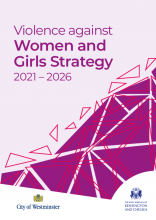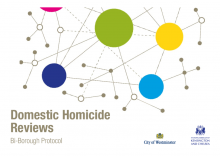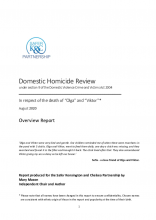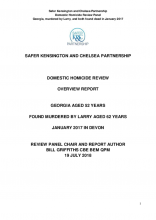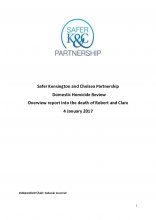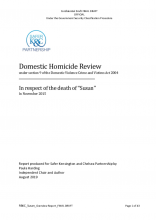Domestic Abuse and Violence Against Women and Girls
Violence Against Women and Girls (VAWG) is the umbrella term used to describe a range of violent and abusive acts and behaviours, including:
- domestic abuse (including coercive control)
- rape and sexual violence
- female genital mutilation
- forced marriage
- crimes in the name of 'honour'
- sexual harassment
- stalking
- trafficking
- prostitution/sexual exploitation
Anyone can experience VAWG regardless of their age, race, culture, sexuality or religion, however we know that it disproportionately affects women and girls. If you are experiencing abuse, support is available, visit the Government website for more information.
Support available
-
Support available for victims and survivors
-
Support from the police
In an emergency, always dial 999. For non-emergency support call 101.
If you are in danger and unable to talk on the phone, call 999 and then press 55. This will transfer your call to the relevant police force who will assist you without you having to speak.
Support from VAWG Services
The Angelou Partnership
The Angelou Partnership offer access to 10 specialist services through one front door.
Angelou can provide support if you have been subjected to any form of VAWG. The Angelou Partnership can offer support ranging from increasing safety and understanding the criminal justice system, to enhancing emotional wellbeing. The partnership can support you over the phone, face to face, or in a group format depending on the needs and preferences of those affected. They provide specialist support to Black, Minority and Ethnic and Lesbian, Gay, Bisexual and Transgender communities.
Angelou support is moving from face-to-face sessions to telephone and online based support. please contact the numbers below for support and details of service provision. Visit the Angelou Partnership website for more information.
Contact Angelou by phone on tel: 0808 801 0660
- Monday, Tuesdays, Thursday and Fridays: 10am – 4pm
- Wednesdays: 10am - 4pm and 6pm to 9pm.
Translators are available.
Outside of those hours the National Domestic Abuse Helpline can be of support and is available 24 hours a day on 0808 2000 247.
- Support is you have no recourse to public funds
-
- Telephone: 0208 571 0800
- Open Monday to Wednesday, and Friday, 9.30am to 4.30pm.
- Telephone: 020 7490 7689
- Open Monday and Thursday, 10am to 1pm and 2pm to 5pm
- Support if you are worried about hurting someone
-
If you are worried about some of your behaviours and you want to take steps to change them, support is available to help you.
Respect Phoneline is a team of friendly advisors available to speak in confidence with you about your violence and domestic abuse. They can be contacted on 0808 8024040 weekdays between 9am and 8pm. You can also visit the Respect Phonline website.
- Housing Support
-
Support is available if you either want to stay in your home or leave. Details of this can be found by visiting the Domestic abuse housing support page.
- Support from Family and Children’s Services
-
If you are worried that a child or young person in Kensington and Chelsea is at immediate risk, please contact the assessment and access team duty social work team immediately at Tel: 020 7361 3013 or email [email protected] .
Out of hours: If you need a service in an emergency between 5pm and 9am on weekdays or 24 hours a day at weekends and bank holidays, you can contact the Emergency Duty Team on 0207 373 2227.
Our Family Services teams are working as usual to visit families and respond to their needs.
If you are worried that a child/family are at immediate risk, please contact the Police on 999.
- Support from Adult Safeguarding Services
-
Adult Safeguarding referrals should be made to the Information & Advice Team. However, for escalation purposes, please use the contact details provided:
Safeguarding Operational Team
- RBKC Safeguarding Lead: Hugh Constant
- Tel: 07855 160 880
- Email: [email protected]
- National Support and Helplines
-
The Freephone National Domestic Violence Helpline: (run in partnership between Women’s Aid and Refuge)
- Telephone: 0808 2000 247
Forced Marriage Unit
- Telephone: 0800 028 3550
- Email: [email protected]
Female Genital Mutilation Helpline
- Telephone: 0800 028 3550
- Website: www.childline.org.uk
Paladin (for stalking)
- Telephone0203 866 4107
- Website: www.paladinservices.co.uk
NSPCC (for FGM)
- Telephone: 0800 028 3550
Karma Nirvana (for so called ‘honour’ based violence)
- Telephone: 0800 5999 247
Support for male victims
Men’s Advice Line
- Telephone: 0808 801 0327
Victim Support Helpline
- Telephone: 0808 168 9111
Support for perpetrators
Respect
- Telephone: 0808 802 4040
Our strategic response to VAWG
Ending Violence against Women and Girls is a local strategic priority. We have recently launched a new 5-year strategy which builds on our previous work and explains our approach going forward.
This partnership strategy has been co-produced by partners, including survivors, residents, and local businesses, and sets out our strategic vision to make our boroughs safe for anyone who is living, working, visiting, and travelling in Kensington and Chelsea.
Domestic Homicide Reviews (DHR)
When someone has been killed as a result of domestic abuse (domestic homicide) a review into the help and support they may have received from the Council, Police and other agencies should be carried out.
What happens when someone is killed as a result of domestic violence?
Professionals involved in the case must review what happened so that they can identify what may need to be changed to reduce the risk of it happening again in the future.
DHRs are not enquiries into how the victim died or into who is responsible. The purpose of a DHR is to understand where there are lessons to be learned and make recommendations to prevent future homicides.
Family members, friends and colleagues of the victim are important to the DHR process. The independent chair will aim to make contact with friends and family, to enable them to inform the review and build a complete view of the circumstances leading up to the homicide.
The Home Office has published guidance on when a domestic homicide review needs to be carried out and how to do this.
Find out more about our local approach by viewing our DHR protocol below.
- Published Domestic Homicide Reviews
-
A related Serious Case Review was commissioned by the Local Safeguarding Children Board into the death of Clare and serious injury to Ann.
Clare and Ann Serious Case Review
Last updated: 21 December 2023

